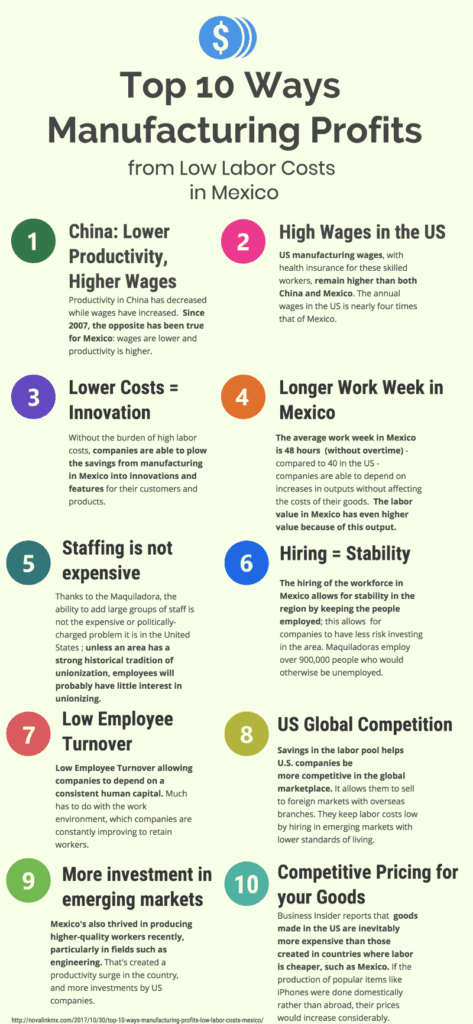Last Updated on October 19, 2023
Maquiladora vs. Offshoring: how do they differ from each other? As companies operate in an increasingly globalized market, they constantly look for ways to reduce costs and improve efficiency. Maquiladoras and offshoring are two popular strategies for achieving these goals.
Throughout this article, we'll explore the key features, advantages, and potential drawbacks of these two manufacturing options in order to help you make informed decisions.
Understanding Maquiladoras
Maquiladoras are manufacturing facilities, often located in Mexico, that allow companies to benefit from lower labor and operating costs. These facilities import raw materials or components duty-free for assembly, processing, or manufacturing and export the finished products. This practice has been prevalent for decades and is often employed by industries like electronics, automotive, and textiles.
Offshoring: A Broad Concept
Offshoring is a broad concept that encompasses relocating various business operations, including manufacturing, to foreign countries. While it can involve manufacturing processes, it can also extend to services like customer support and software development. Offshoring is used to save money while maintaining or improving product quality.
Key Differences
Let's dive deeper into the differences between Maquiladora vs. Offshoring:
Location
Maquiladoras are typically concentrated in Mexico, particularly near the U.S.-Mexico border. In contrast, offshoring can involve a multitude of countries, particularly in Asia, offering businesses a wide range of options.
Scope
Maquiladoras focus primarily on manufacturing operations, while offshoring encompasses a broad spectrum of business processes, including manufacturing, customer service, and software development.
For perspective, manufacturing represented 19 percent of Mexico’s overall GDP and 19 percent of employment. In the U.S., manufacturing accounts for 11 percent of GDP and 8.4 percent of employment.
Besides auto parts and automobiles, maquiladora production includes electronics, medical devices, aircraft parts and machinery. Maquiladoras also sell engineering services.
Dallas Federal Reserve
Legal Framework
Maquiladoras often operate under specific legal agreements between the U.S. and Mexico, which provide tax incentives and exemptions. Offshoring, on the other hand, may not be subject to the same bilateral agreements and can vary significantly from one country to another.
Labor Costs
Maquiladoras often offer competitive labor costs due to lower wages in the region. Offshoring also seeks to reduce labor costs but involves countries with varying wage levels.

Advantages of Maquiladoras
Maquiladoras have several advantages, including:
Proximity to the U.S.
Geographical closeness to the U.S. market allows for shorter supply chains and reduced transportation costs.
Tax Benefits
Maquiladoras enjoy tax incentives and duty exemptions, saving companies significant costs.
Skilled Workforce
Over the years, Mexico has developed a skilled workforce in various industries, making it an attractive option for manufacturing.
Advantages of Offshoring
Offshoring offers its own advantages, such as:
Global Reach
Offshoring allows businesses to tap into a diverse range of countries, each offering unique advantages for different types of operations.
Cost Flexibility
Businesses can adapt to changing economic conditions and labor costs by choosing from various countries.
Specialization
Offshoring enables businesses to tap into specialized labor markets, such as technology hubs or creative centers.
Considerations and Potential Drawbacks
It's essential to consider the potential drawbacks of both Maquiladora vs. Offshoring:
Legal Complexity
Maquiladoras may involve navigating complex legal frameworks. Offshoring can also be subject to legal and regulatory challenges in different countries.
Supply Chain Risk
Both options can expose companies to supply chain risks, such as geopolitical instability, transportation disruptions, and currency fluctuations.
Conclusion
In summary, Maquiladora vs. Offshoring are two strategies to reduce manufacturing costs and improve efficiency. Maquiladoras offer proximity and tax benefits, while offshoring provides a broader array of options and flexibility. The choice between these strategies depends on your business's specific needs, risk tolerance, and long-term goals.
FAQs
1. Which industries commonly use maquiladoras?
Maquiladoras are prevalent in industries such as electronics, automotive, textiles, and aerospace.
2. Are there legal constraints when considering offshoring?
Yes, different countries have varying regulations, labor laws, and tax policies that can impact the offshoring process.
3. Is offshoring suitable for small businesses?
Offshoring can be beneficial for small businesses, but it requires careful planning and research to ensure success.
4. How do companies protect against supply chain risks in maquiladoras and offshoring?
Companies can implement risk management strategies, such as diversifying suppliers and having contingency plans in place.
5. What are the key considerations when choosing between maquiladoras and offshoring?
Consider factors such as location, cost, legal complexity, and the nature of your business operations when making this decision.
About NovaLink
As a manufacturer in Mexico, NovaLink employs a unique approach that transcends the traditional model of shelter production. More than just the location of your manufacturing, we would like to become a partner in your manufacturing in Mexico. You will be able to relocate or initiate manufacturing for your company in Mexico in a low-cost labor environment with very little delay or up-front costs. Find out how we can help you by handling the manufacturing process.
There are NovaLink facilities in the border cities of Brownsville, Texas, Matamoros, Mexico, and Saltillo, Mexico.
Explore More: Discover Related Blog Posts
Expand your knowledge and delve deeper into Maquiladoras in Mexico with our curated collection of related blog posts.
- What Type of Company Should Not Move to Mexico?
- Mexico’s Manufacturing Workforce in 2025: A Game-Changer for Global Industry
- How to Find the Best Maquiladora for Your Manufacturing Needs
- Strategic Measures to Fortify Mexico’s Textile Industry Under President Claudia Sheinbaum
- Labor vs. Land: What Costs More in Mexican Manufacturing?